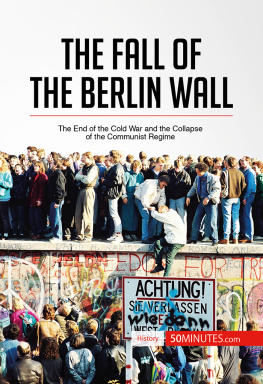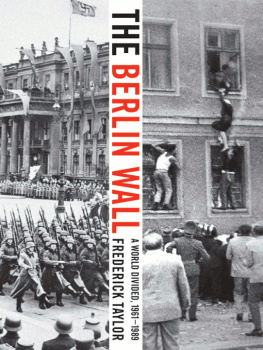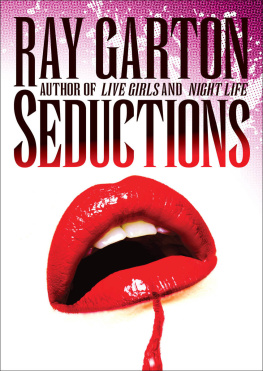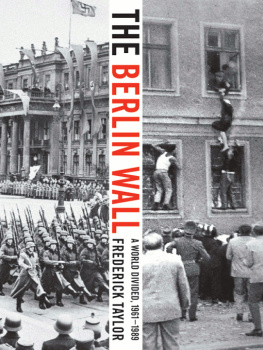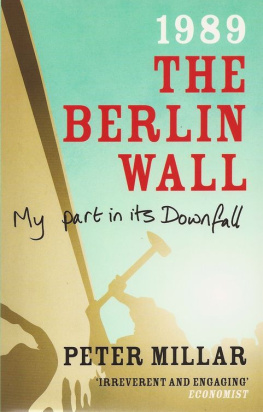Timothy Garton Ash
Timothy Garton Ash is the author of The File, In Europes Name, Facts Are Subversive, and three volumes of history of the present: The Polish Revolution (winner of the Somerset Maugham Award), The Uses of Adversity, and The Magic Lantern, his personal account of the revolutions of 1989, which has now appeared in sixteen languages. His essays, including regular contributions to The New York Review of Books and the Guardian, have been recognized with the George Orwell Prize. He is a fellow of Saint Antonys College, Oxford, and the Hoover Institution, Stanford University.
@fromTGA
www.timothygartonash.com
A LSO BY T IMOTHY G ARTON A SH
The Polish Revolution: Solidarity
The Uses of Adversity: Essays on the Fate of Central Europe
The Magic Lantern
In Europes Name: Germany and the Divided Continent
The File: A Personal History
History of the Present: Essays, Sketches and Dispatches from Europe in the 1990s
Free World
Facts Are Subversive: Political Writing from a Decade without a Name
Berlin: Walls End
from The Magic Lantern
by Timothy Garton Ash
A Vintage Short
Vintage Books
A Division of Random House LLC
New York
Copyright 1990, 1993, 1999 by Timothy Garton Ash
All rights reserved. Published as part of The Magic Lantern in the United States by Vintage Books, a division of Random House LLC, New York. Originally published in hardcover in Great Britain in somewhat different form by Granta Books, Cambridge, as We the People: The Revolution of 89 as Witnessed in Warsaw, Budapest, Berlin, and Prague and in the United States as The Magic Lantern by Random House, an imprint and division of Random House LLC, New York, in 1990, and subsequently, with additional material, in paperback by Vintage Books, a division of Random House LLC, New York, in 1993 and 1999.
Earlier versions of much of the material in this were originally published in the New York Review of Books.
Vintage and colophon are registered trademarks of Random House LLC.
The Cataloging-in-Publication Data for The Magic Lantern is available from the Library of Congress.
Cover design by Joan Wong
Vintage eShort ISBN: 978-1-101-91124-2
www.vintagebooks.com
v3.1_r1
Contents
Berlin: Walls End
Once upon a time, and a very bad time it was, there was a famous platform in West Berlin where distinguished visitors would be taken to stare at the Wall. American Presidents from Kennedy to Reagan stood on that platform looking out over the no mans land beyond. They were told that this, the Potsdamer Platz, had once been Berlins busiest square, its Piccadilly Circus. Their hosts pointed out a grassy mound on the far side: the remains of Hitlers bunker. East German border-guards watched impassively, or rode up and down the death strip on their army motorbikes.
On the morning of Sunday, 12 November I walked through the Wall and across that no mans land with a crowd of East Berliners, a watchtower to our left, Hitlers bunker to our right. Bewildered border-guards waved us through. (As recently as February their colleagues had shot dead a man trying to escape.) Vertical segments of the wall stood at ease where the crane had just dumped them, their multicoloured graffiti facing east for the first time. A crowd of West Berliners applauded as we came through, and a man handed out free city plans. Then I turned round and walked back again, past more bewildered border-guards and customs officers. Ahead of me I noticed a tall man in an unfamiliar green uniform. He turned out to be the US commandant in Berlin, one General Haddock.
By nightfall, West Berlin workers had dismantled the famous platform, like an unneeded prop. Europes Mousetrap had ended its twenty-eight-year run. Clear the stage for another show.
Everyone has seen the pictures of joyful celebration in West Berlin, the vast crowds stopping the traffic on the Krfurstendamm, Sekt corks popping, strangers tearfully embracingthe greatest street-party in the history of the world. Yes, it was like that. But it was not only like that. Most of the estimated two million East Germans who flooded into West Berlin over the weekend simply walked the streets in quiet family groups, often with toddlers in pushchairs. They queued up at a bank to collect the 100 Deutschmarks greeting money (about thirty-five pounds) offered to visiting East Germans by the West German government, and then they went, very cautiously, shopping. Generally they bought one or two small items, perhaps some fresh fruit, a Western newspaper and toys for the children. Then, clasping their carrier-bags, they walked quietly back through the Wall, through the grey, deserted streets of East Berlin, home.
It is very difficult to describe the quality of this experience because what they actually did was so stunningly ordinary. In effect, they just took a bus from Hackney or Dagenham to Piccadilly Circus, and went shopping in the West End. Berliners walked the streets of Berlin. What could be more normal? And yet, what could be more fantastic! Twenty-eight years and ninety-one days, says one man in his late thirties strolling back up Friedrichstrasse. Twenty-eight years and ninety-one days since the building of the Wall. On that day, in August 1961, his parents had wanted to go to a late-night Western in a West Berlin cinema, but their eleven-year-old son had been too tired. In the early hours they woke to the sound of tanks. He had never been to West Berlin from that day to this. A taxi-driver asks me, with a sly smile: How much is the ferry to England? The day before yesterday his question would have been unthinkable.
Everyone, but everyone, on the streets of East Berlin has just been, or is just going to West Berlin. A breathless, denim-jacketed couple stop me to ask, Is this the way out? They have come hot-foot from Leipzig. Our hearts are going pitter-pat, they say, in broad Saxon dialect. Everyone looks the same as they make their way homeexcept for the tell-tale Western carrier-bag. But everyone is inwardly changed, changed utterly. Now people are standing up straight, says a hotel porter. They are speaking their minds. Even work is more fun. I think the sick will get up from their hospital beds. And it was in East rather than West Berlin that this weekend had the magic, pentecostal quality which I last experienced in Poland in autumn 1980. Ordinary men and women find their voice and their courageLebensmut, as the porter puts it. These are moments when you feel that somewhere an angel has opened his wings.
They may have been ordinary people doing very ordinary things, but the Berliners immediately grasped the historical dimensions of the event. Of course the real villain was Hitler, said one. A note stuck to a remnant of the Wall read: Stalin is dead, Europe lives. The man who counted twenty-eight years and ninety-one days told me he had been most moved by an improvised poster saying: Only today is the war really over.
Bild newspaperWest Germanys Suncarried a black-red-gold banner headline declaring Good Morning, Germany, and underneath it an effusive thank-you letter from the editors to Mikhail Gorbachev. The East Germans also felt grateful to Gorbachev. But more important, they felt they had won this opening for themselves. For it was only the pressure of their massive, peaceful demonstrations that compelled the Party leadership to take this step. You see, it shows Lenin was wrong, observed one worker. Lenin said a revolution could succeed only with violence. But this was a peaceful revolution. And even the Partys Central Committee acknowledged at the beginning of its hastily drafted Action Programme that a revolutionary peoples movement has set in motion a process of profound upheavals.


